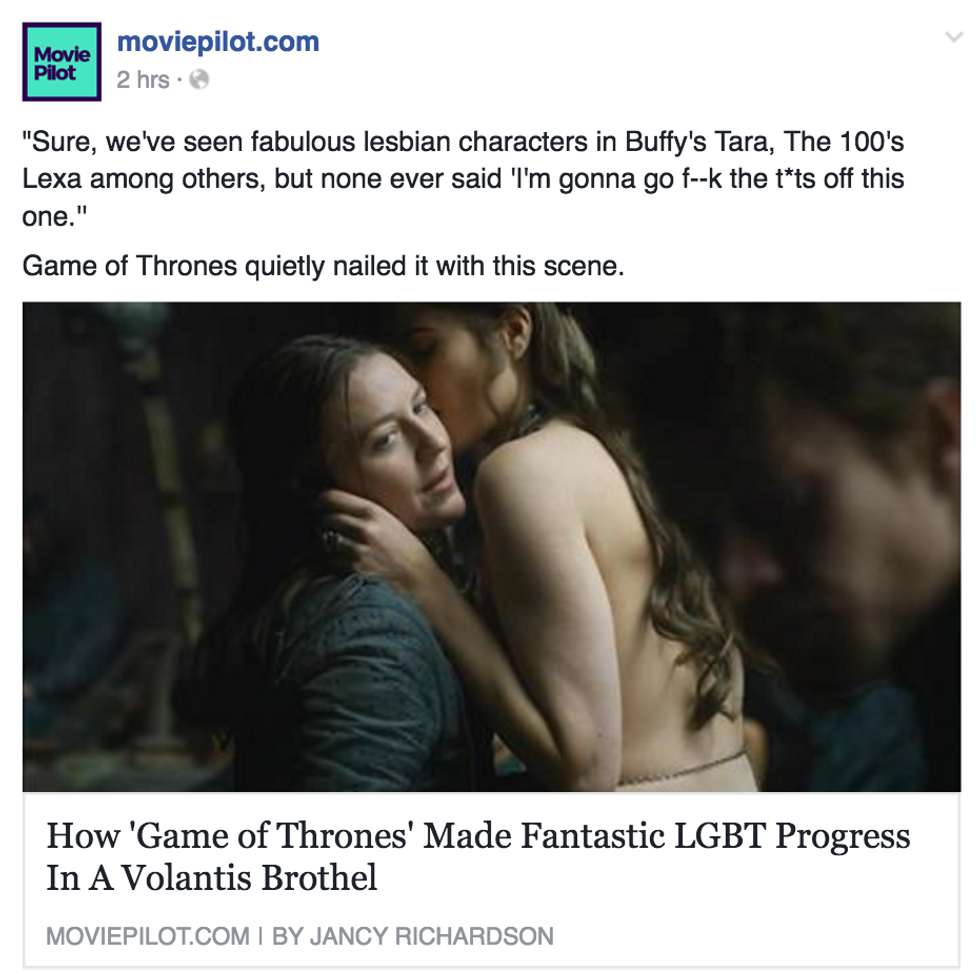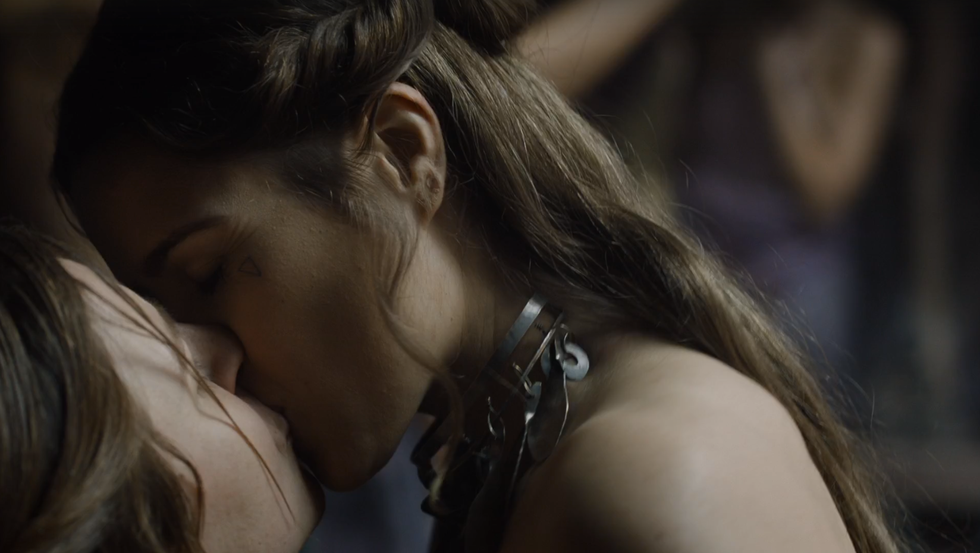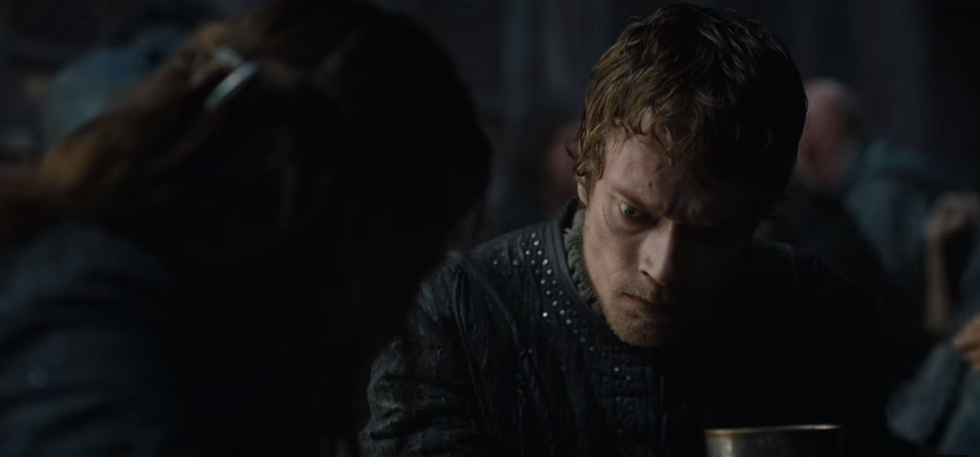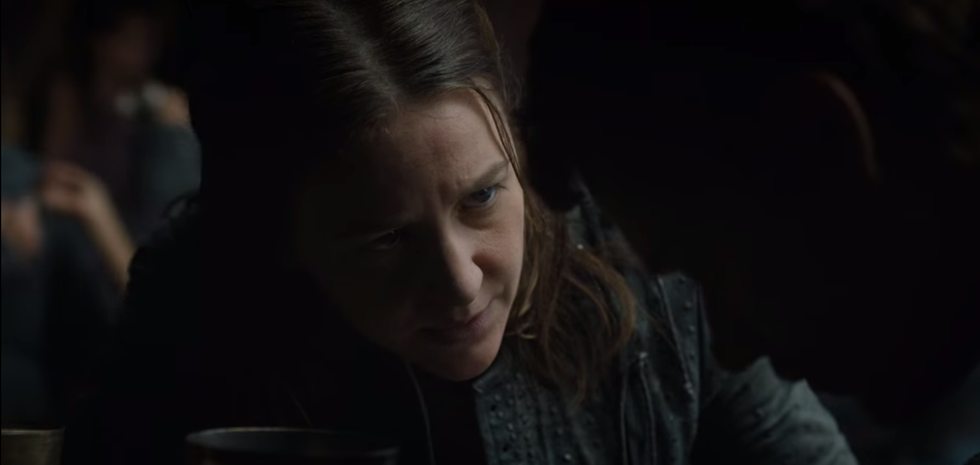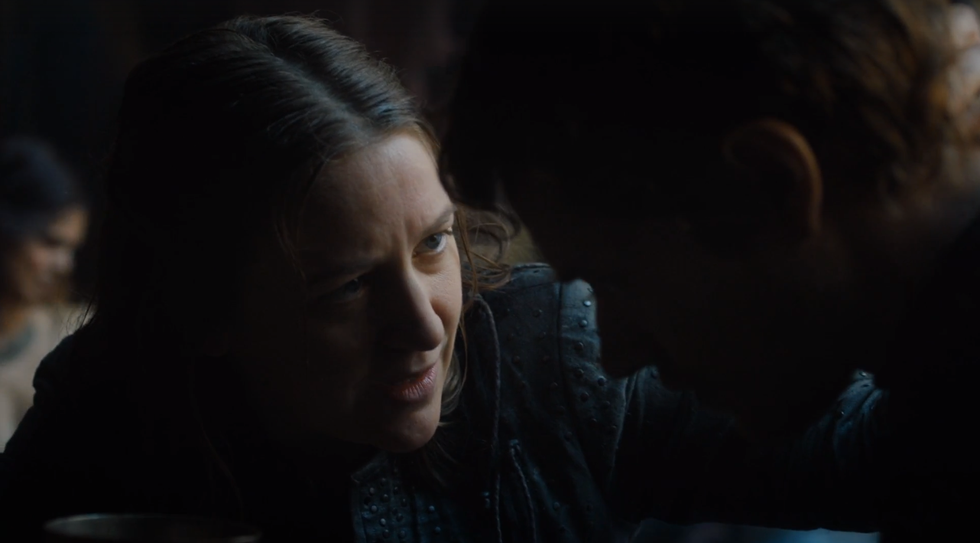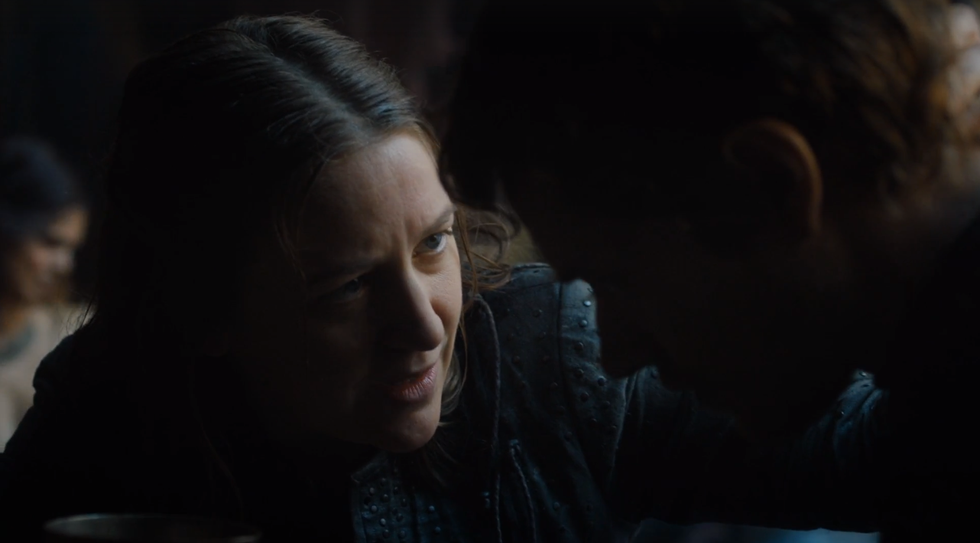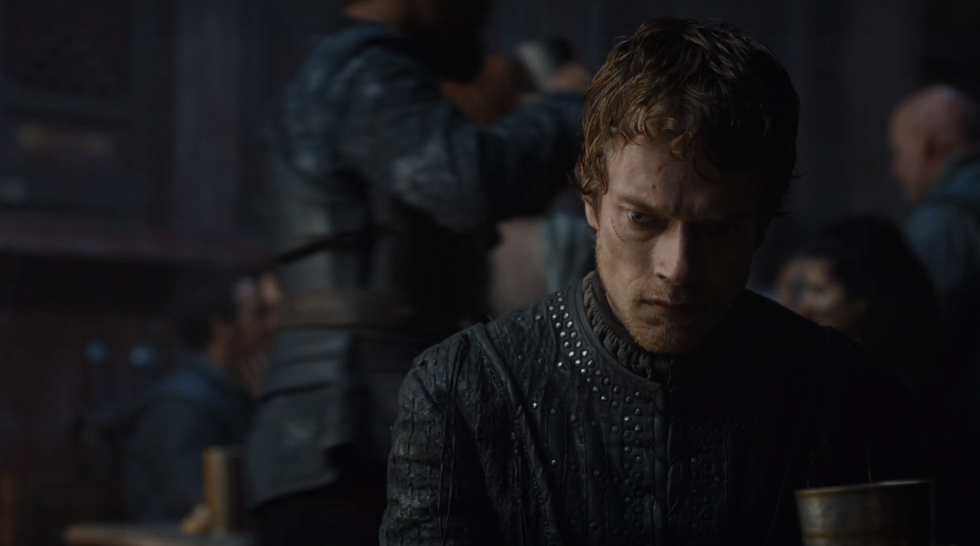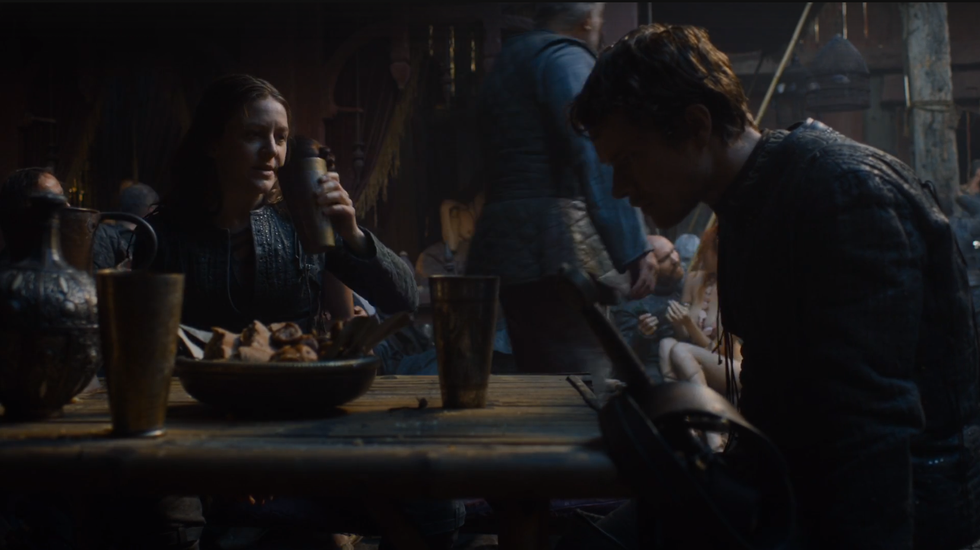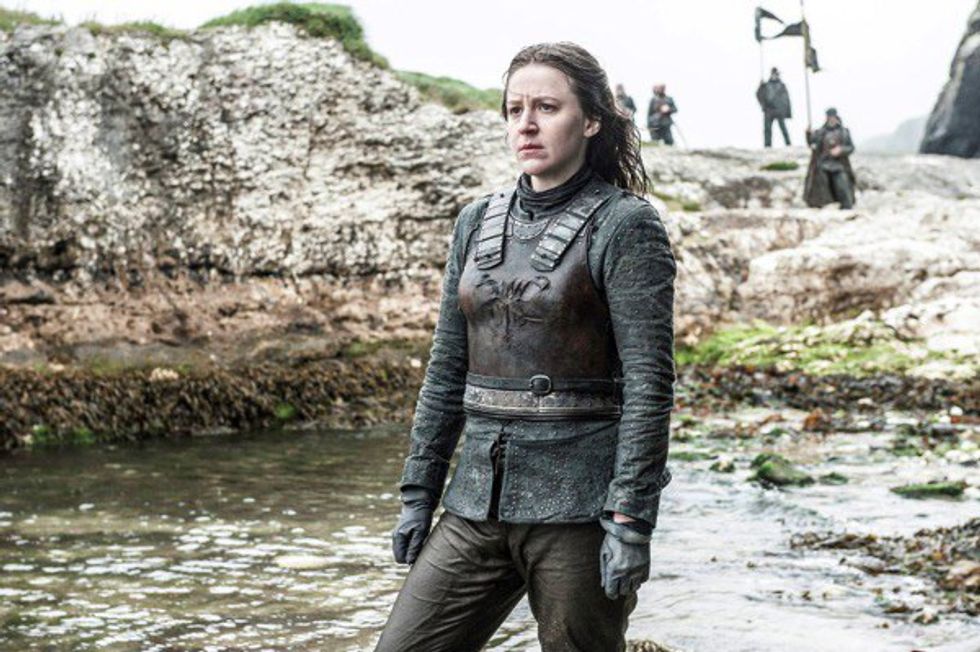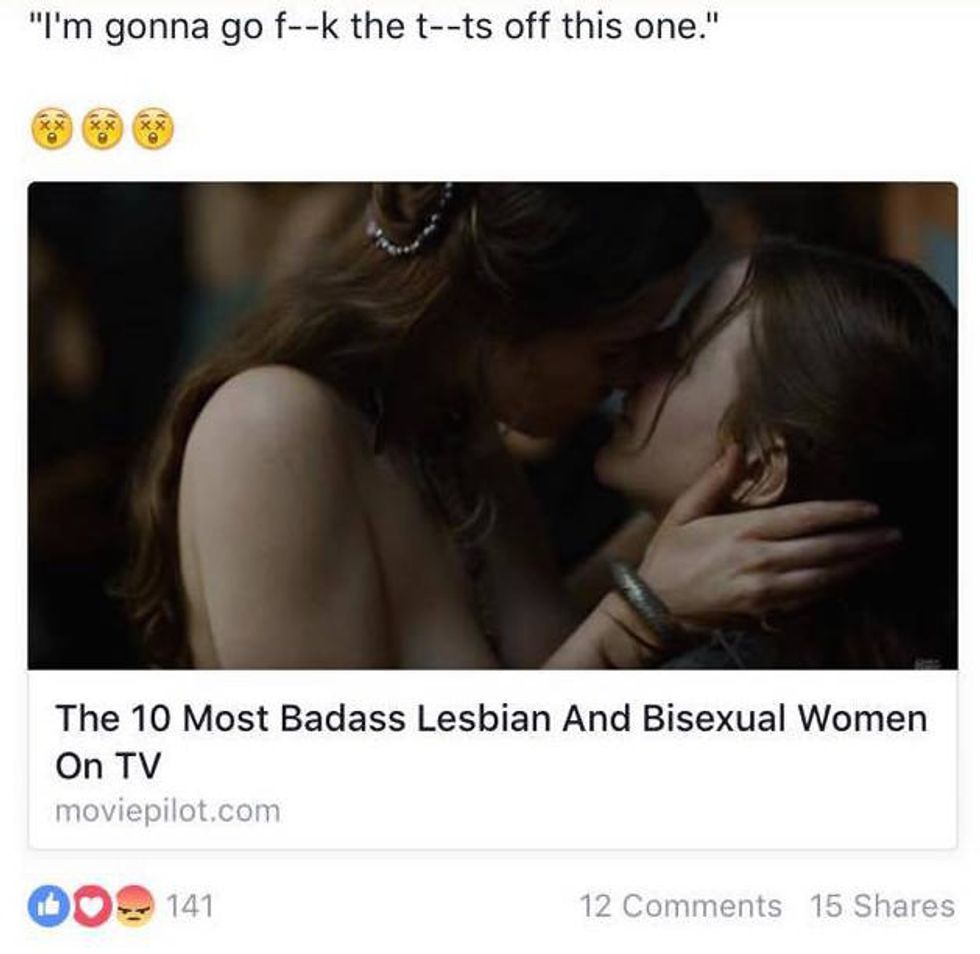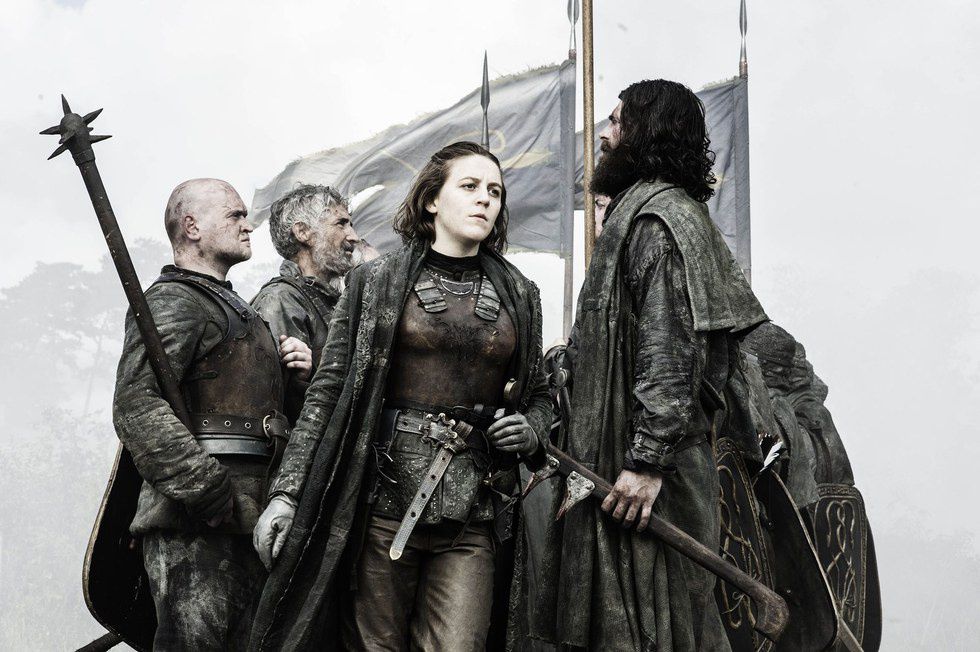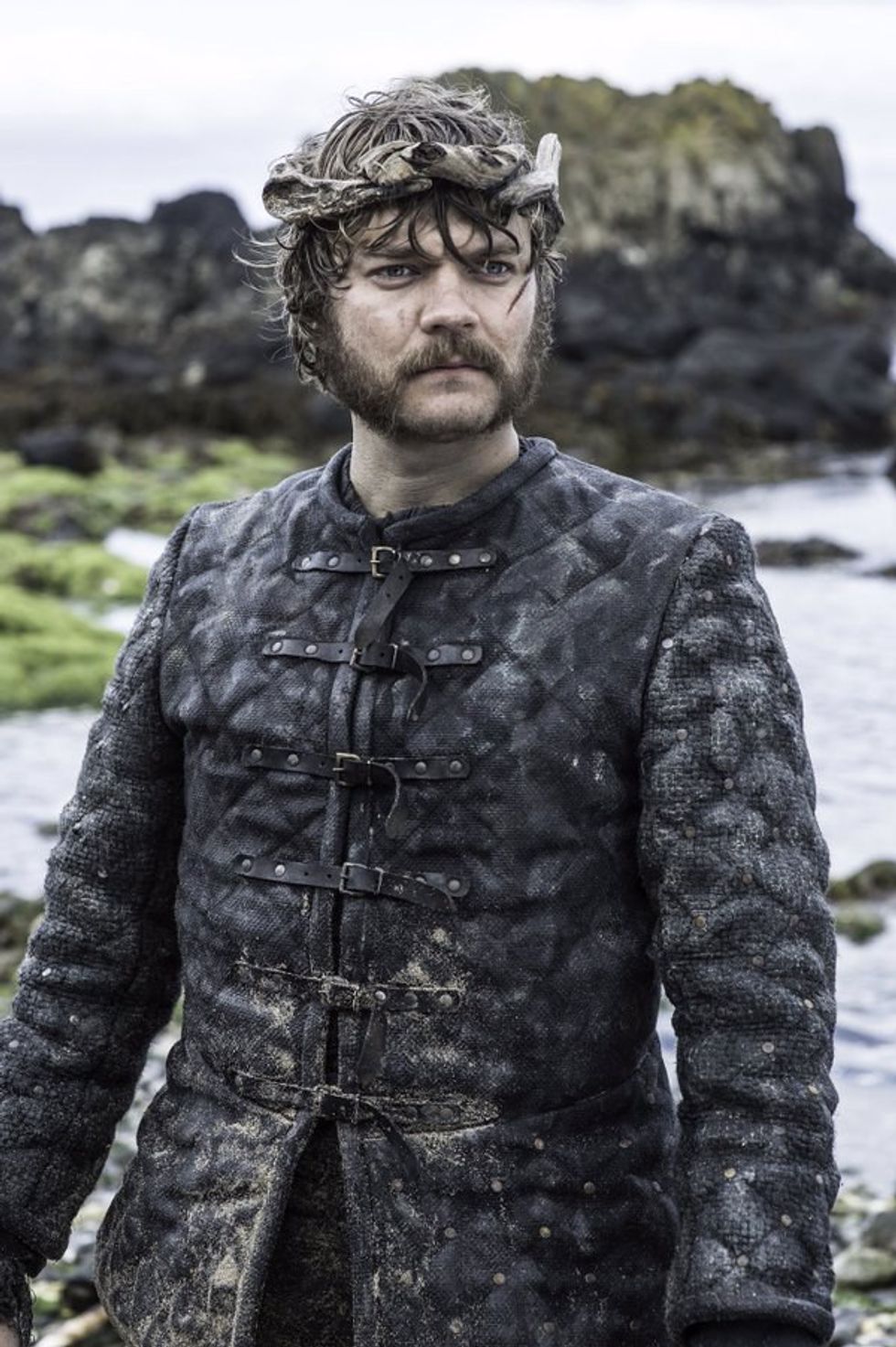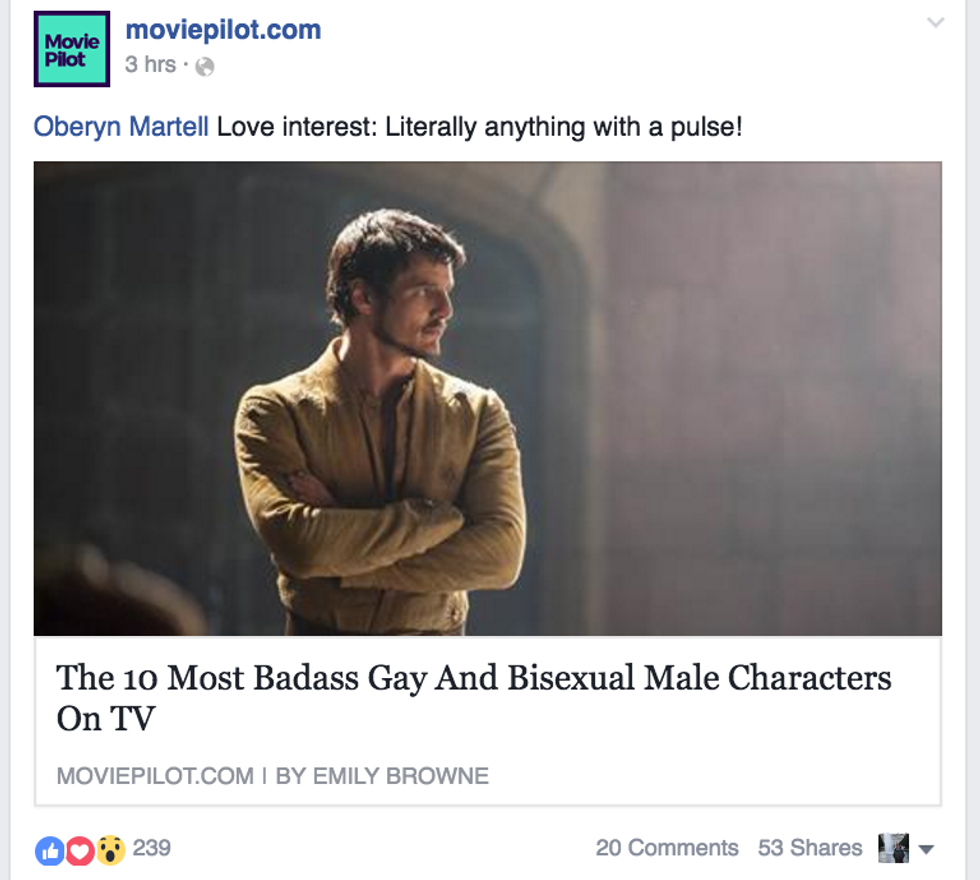This past season of HBO’s critically acclaimed Game of Thrones has certainly had it’s issues. Most of it was the result of writing and scene direction, but for the most part, it remained, at the very least, enjoyably frustrating. It’s most definitely a show that has crossed the line in the past. They've characters and plots that I loved and cherished from the source material and threw them into a blender. This past season was not exception. If anything, it’s only gotten worse. There’s been an underlying build up of racism bubbling to the surface with Daenery’s faux-feminist storyline that has been culminating over the past few years, the blatant disappearing patriarchy that only reappears when the show feels the need to degrade and assault female characters but refuses to explore it on a more challenging and intellectual level, enough whitespalaining and mansplaining to encapsulate it’s own essay, and “hold the door” ableism. The show and this season are not without critique already, but this past week’s episode, entitled “The Broken Man” seemed to transport me from a place of enjoying to critique it as a piece of media to general disgust. That’s not to say the other storylines referred to above didn’t leave the same bad taste in my mouth, but this one multiplied that bad taste exponentially, perhaps because it was a part of me that I felt was grossly portrayed as “representation,” as well as the insistent praising of said “representation” in both the narrative and general pop culture media immediately following. The storyline I’m referring to is, of course, Yara and Theon’s scene in Episode 7 in which Yara rapes (yes, it’s rape) a female sex slave and abuses Theon, which then allowed for it to be heralded across the internet and world as a stunning piece of feminism, lesbian representation, and sibling support.
Recommended for you
Opening the scene, we find the Greyjoy fleet has docked at Volantis, an old and proud Free City of Essos. Immediately after some beautiful establishing shots of Volantis and it’s famous Long Bridge, we’re hit with something we see quite often on this show, topless women on top of laps and being felt up by men. Theon sits in the middle of this brothel, obviously panicked and triggered by the whole situation. He’s visibly uncomfortable. Yara Greyjoy then proceeds to sit down at his table, kissing a girl, a shot that appeared and was the cause of much speculation in the season trailer. A pattern has emerged amongst these women, as we get a tight shot of the girls face, and we notice her tattoo just under her eye. It is a tear drop tattoo and all of the other women in the scene have it as well. It is the mark of a slave. Theon, bothered by the whole environment asks Yara “Why did we have to come here?” and she replies that “Some of us still like it,” as if he had any agency in his situation and the effect the abuse left on him. It’s different than a situation where I don’t drink but when I go out with friends or family who do, I am comfortable in the situation because it is my active choice to decide not to drink. Theon has had no choice in the matter. He hasn’t decided himself that he no longer feels those urges or feels triggered by the situation. All of that was a result of the abuse done to him. What Yara says and does by bringing Theon here in the first place is the equivalent to bringing a recovering alcoholic to a bar and taunting them for not wanting to engage in an activity that is clearly triggering and emotionally damaging for them, multiplied to the tenfold.
Theon tries to look away and Yara, noticing his discomfort, tries to get him to drink. He tells her he doesn’t want to, so she sighs and sends the female sex slave away, telling her “Don’t go far, love,” already inciting the notion that dealing with Theon’s ‘problems’ are a bother to her. As the sex slave walks away, Yara laughs happily that “Nothing on the Iron Islands has an ass like that,” questioning her brother, “Doesn’t interest you anymore?” Theon looks anxious and upset so Yara relents, apologizing to him and saying she “wont joke about it anymore.” “I wont hurt you little brother,” she tells him. “Don’t you know that?” For a moment, this all seemed like a beautiful moment of her cultural background and dialogue coming to the forefront. The Ironborn culture could have left an impact on her like this, similar to way our parents will occasionally say something out of turn or offensive without understanding why it’s offensive because it’s been ingrained into their brains. It could have been a really interesting exploration of that piece of Yara, struggling between navigating with and against the patriarchal standards that populate the Ironborn culture. In a real moment of love for her brother and a want to make him feel safe and comfortable, the resistance triumphs and allows her to understand her internalization of this culture and thus allowing her to apologize. That challenge and that nuance that seemed to rear it’s head quickly goes away. The two then discuss the impending doom of Euron’s wrath, after which Yara encourages her brother to drink again, bringing us back to the toxic and abusive place we were in before. Then repeats that he does not want any, but Yara refuses to relent.
“I don’t care what you want. Drink,” she pushes, not even considering what is actually going on in her brother’s head. Theon takes a small sip, backing down, but she pressures him into drinking it all, proclaiming “You’re Ironborn, Theon. I know you’ve had some bad years…” to which Theon responds shocked and perturbed, “Some bad years?” For a moment, the writing seems to be on our side. We’re too shocked by Yara’s dismissal of Theon’s years of abuse, something that seemingly rocked her enough to go rescue him previously, as nothing more than “some bad years.” He endured what no human being should ever have to endure, something she seemingly understood before, but now, his abuse is apparently a burden for her. “…I’m tired of watching you cower like a beat dog,” she chides him. She makes him drink more of the ale, telling him that she needs him. “The real Theon Greyjoy, not this rat shit pretender. Can you find him for me?” she spits.
As we being our decent into the horrific and problematic once again, we seem to have a moment of respite. Yara reassures Theon that he is safe now and that he got away, swearing they will get revenge for what was done to him. This second of understand washes away again, for in the next moment, after forcing him to down more ale, she sits closer, muttering the line that crossed all boundaries. “Listen to me. If you’re so broken that there’s no coming back, take a knife and cut your wrists. End it,” she tells him. Yara literally gives her scared, broken, and abused brother the ultimatum of suicide versus overcoming his trauma, as if that’s a choice one can just so easily decide to do. She tells him that if he will be the “old Theon” again, she would want and need him by her side in order to defeat their uncle and make a pact with he Dragon Queen to take back their home. Yara then stares at him, holding his head in hers, and asks him if he ‘is really with her.” Theon looks up, nodding, and determined in a moment that we are meant to interpret as a bit of the “old Theon,” returning. After he accepts, she gets up excited and triumphant and walks over to the sex slave, walking off and proclaiming she’s going to “fuck the tits off of this one.”
My immediate emotional reaction to this scene was general revulsion. I sat there dumbstruck at how they could have made this scene far worse than I could possibly have imagined it based off of the trailer, and how people online where shouting happily about the fact that Yara is a lesbian and how great of a piece of representation what they just saw on their screen was. It took me a moment, because of this disparity of opinions, to come to terms with the fact that I wasn’t over exaggerating. I realized that people are so starved for any form of themselves being represented on the screen as a valid identity that even the most disgusting, problematic portrayal seems like a victory. That, and the common and mainstream dialogue centering around the show seems afraid to actually critique it’s flaws, so I first questioned whether or not I was making something bigger than it actually was. I wondered if my read on the situation was plagued by bias and assumption that the creators and writers meant something more sinister than they actually did. However, once I watched the “Inside the Episode,” where Showrunners and Executive Producers David Benioff and D.B. Weiss confirmed my worse fears ten times over. I always assume that they can’t actually be implying what I read in the situation, giving them the benefit of the doubt, but then every time I watch the “Inside the Episode,” immediately all of those implications are revealed to be what they were actively and knowingly striding for.
One of the biggest problems I have with the show in general is framing. You’re allowed to depict something horrible, as long as you are communicating it as a heinous and horrible moment to the audience. It’s the age old battle of depiction versus endorsement. You're allowed to depict something horrible, as long as the lens though which you tell your film doesn’t endorse it. While it would still be disgusting character assassination and bad representation, if they at least framed Yara as the negative, as the monster in the scene, then I would have been more comfortable with watching it play out on my screen. If Yara’s verbal abuse of an abuse victim and rape of a sex slave was looked at through a lens indicating that what she is doing isn’t right, highlighting her wrongdoings, then it wouldn’t be as problematic as it was. Instead, it was looked at as a positive.
David Benioff and D.B. Wiess open the Yara portion of the “Inside the Episode,” speaking of Yara’s love for her brother. Benioff proclaims she’s the only one who has ever loved and supported Theon (are we forgetting Robb Stark?) and reminds us of the infamous time when she tried to rescue him while he was imprisoned. Already, we are setting up their relationship and her connection with her brother as a positive. As we move into the scene, it becomes clear that their interpretation and direction was Yara was “fixing” Theon. What is there to “fix”? He is not a broken toy, easily put back together. He is a human being with thoughts and feelings who was mentally and physically tortured, abused, and broken down. One can’t simply have a before and after in those situations. One cannot forget those moments and memories and “return,” to the person they were. There are reminders all over their body and plaguing their thoughts. It will always be a disturbing, horrifying, and triggering part of the victim’s life. As with any issue, they can learn to cope with it, but it doesn’t just go away. Benioff then describes Yara’s love as a “tough love,” insisting that she’s not a “therapist” in our sense of the word, but it’s a “pretty brutal type of therapy,” because “that’s who they are.” To even utter the words “therapy” and “tough love,” in conjunction with clear mental abuse is troubling and revolting to me. How can they not see that this is not okay? This is not positive. Yara claims that she wants the “old Theon back,” as if he’s being selfish for reacting to his abuse. She wants someone to return to the way that they were before they were tortured out of her own selfish want and needs. Also, what does wanting the “old Theon back” entail? If that was even something that was possible, which it is not, why would she want back the Theon that sexually assaulted her on his return to Pyke? The “old Theon” was the Theon that would never have supported her or her endeavors before. The “old Theon” would have stood against her at the Kingsmoot and declared himself the rightful heir. So why she would wish for in the first place is a mystery, but then there’s the simple notion that “old Theon” can’t be brought back. He’s not going to forget what happened to him and that’ the only way he can become the oh so “great” person he “was.” That Theon was formed out of his experience as a captive ward of the Starks, raised as neither Stark nor Greyjoy, never really knowing where to fit in. The current Theon is shaped by his recent horrific experiences. There’s not such thing as before and after with abuse. There’s during and then there’s coping and recovery. It’s not an experience one can just sweep under the rug and forget.
There’s such a danger to put all of this out there into the general and cultural consumption of media that, even in a tough world like Westeros and areas the Iron Islands, abusing an abuse victim is a positive. It's a positive in the writers' minds as well. The idea that somehow the victim can forget and move past their abuse is ignorant and offensive. It’s a dangerous concept that they’ve built up on this show constantly, and it needs to stop, as they consistently fail to show the aftermath of what dealing with abuse and violence is actually like. It also happened with Sansa after least years controversy. Where for Sansa, she need to be raped to become the empowered™ and sassy personality she has grown into lately, Theon, needed further abuse to empower™ him to “step up” and out of his abuse. Benioff and Weiss claim that in the look Theon ends up giving Yara, “We get a glimpse of the old Theon that had been lost for so long.” The fact that threatening to kill your abused brother who has been tortured and help prisoner for years is a liberating moment for him just goes to show how little care or consideration is put into understanding the perspective of an actual victim of abuse and violence, and the dangerous cultural complications and problematic impact that come with a moment and idea like this, slowly leaking into our society.
This Yara is flooded with toxic masculinity. The reaction Yara has had to seeing her brother once again this season has been incredibly jarring, disturbing, and virulent. Her relationship with Theon, which was previously established on the show as one of love and care, so much so that she was willing to shake all responsibilities and the will of Balon to attempt a rescue. In season three, she defiantly told her father “I'm going to pick the fastest ship in our fleet. I'm going to choose the fifty best killers on the Iron Islands. I'm going to sail up the Narrow Sea, all the way to the Weeping Water. I'm going to march on the Dreadfort. I'm going to find my little brother. And I'm going to bring him home.” This doesn't sound like the same person who would subsequently tell her brother, when he is in the most need of her support and care, that he should kill himself or forget his trauma. It’s sheer uneven characterization in general. Where previously Yara combated the Ironborn ways of life, commenting on the futility of reaving, she then went on to earn her support at the Kingsmoot by pledging to command the biggest fleet the Iron Islands have ever seen. Where as before, an arc of wanting to change a damaged and futile system was emerging, it began to quickly disappear. All of this feels more like lazy storytelling in general, crafted to fit the needs of being a means to an end for the writers rather than character driven journeys. Especially, in comparison to Asha's (Yara’s book counterpart) reaction to seeing her brother again for the first time, albeit under different circumstances, the takeaway is much stronger and much sweeter. In a show and story that so rarely gives us beautiful and supportive relationships between siblings, where we get either the toxic incestuous relationship between Jaime and Cersei or even a seed of discourse stirring between Jon and Sansa after reuniting, showing this, especially in a people like the Ironborn, would have been beautiful. In a sample chapter from The Winds of Winter, the unreleased next installment of George R.R. Martin’s A Song of Ice and Fire series of which the show is based, Theon describes Asha’s reaction to seeing her brother and hearing his story.
"You have to know your name," he'd told his sister. "You... you told me you were Esgred, but that was a lie. Your name is Asha."
"It is," his sister had said, so softly that he was afraid that she might cry.
She turns her initial disgust at a creature she believed to be pathetic to endearing sincerity, care, and sadness for a brother she thought lost and a brother who had been broken apart.
Not only is Yara verbally abusive when talking to Theon, but all of her interactions with the sex slaves tell another story of sexual abuse. In Volantis, slaves are marked by tattoos. Varys even explains this last year in his chat down the Volantis street with Tyrion. “Slaves?” Tyrion asks him. “Yes,” Varys replies while staring at their tattooed faces. “The Volantine masters are very organized. Flies for dung shovelers. Hammers for builders. Tears for whores, lest they forget.” Thus, it’s already been established, in the show universe not just the books, that Volantis practices slavery and all Volantine slaves are marked by a tattoo. We are even told the specific tattoo that makes a sex slave; a tear drop. The woman Yara kisses has been marked with said tattoo and thus, is a sex slave. It’s information being directly fed to us on the screen, and it’s undeniable.
Yet, the fact that this “glorious” bit of representation was a depiction of rape, not sexual agency, is completely missing from the dialogue regarding this scene. The sex slave has no agency. She is someone’s property who uses her as a good or service like an object, and Yara continues to treat her that way. She’s not free to make the decision to kiss Yara. She’s not free to act on her own accord. If someone is not psychically free, no matter what face they are putting on, they have no agency to make choices that dictate their life. Kissing a sex slave in a brothel isn’t a scene of proud sexuality and consent. If one person can’t properly give consent, it’s rape.
The worst part is, either the writers neglected to realize it’s rape, which they’ve done in the past, or they forgot what they have already written. Further along in that scene with Tyrion and Varys in Volantis, they show up at a brothel where Tyrion proceeds to turn down sex with a sex slave after charming her with his ‘wits’, because he’s too good for that narrative. God forbid we paint Tyrion in a negative light because on the show, he’s turned into a “mary sue”-eqsue character who can do no wrong. He can’t bring himself to have sex with a slave because he knows she has no agency and he’s jut too good of a guy to ever do that. Yet, either they forgot or expected their audience to forget the tattoo that marks them slaves, and so when this scene came about, they expected raves and cheers of support for their great instance of ‘representation.’ By not framing Yara’s interaction with the sex slave as clear rape within the narrative, when in the past season Tyrion’s instance of refusing to partake in sex with her was to further his endless good guy arc and continue to confirm him as a heinous hero who can do no wrong, there are worrying implications. From both a writers standpoint and a storytelling standpoint, this juxtaposition of virtually the only instance of lesbian representation on this show being one of rape, when the straight hero was previously placed in the same situation with a lot more of a complicated underlying narrative where he chose to take the ‘moral’ high ground, says something in the overall framing that is more than just a commentary on the Ironborn way of life.
This scene was one of the only scenes of sexual nature between two women, other than the brothel scenes with Little Finger where they are all for the male gaze, and yet this felt just as gross. This one and only scene, a scene that had many people cheering, was a moment of rape and toxic masculinity internalized to the tenfold. I don’t think you can call it good representation when the lesbian character we’re supposed to identify with and support in the narrative is a rapist and a sexist who believes these women she is raping are things. Even without directly naming the slavery aspect within this episode, she calls the girl that she is going to “fuck the tits off of” “this one.” She’s not circumnavigating within this patriarchal world. She’s perpetuating it here with rape and looking at sex slaves as objects, not people.
Even within the structure and narrative of the Ironborn culture, I can see Euron, Balon, the book character and other Greyjoy uncle Victorian, and even the past-Theon saying this, but Yara? Yara who was born into this lifestyle and culture but as a woman who had no interest in being a Salt Wife. Yara who had to grow up combatting the inherent sexism within her society to rule. One of the best examples of her attitude towards the Westeros’ patriarchy and toxic masculinity in general comes from her POV chapter in A Dance with Dragons. "Cunt again?” she ponders. “It was odd how men like Suggs used that word to demean women when it was the only part of a woman they valued.” Yara has been on the receiving end of a million “cunts” and has been a victim of sexism all her life. Living and growing up on the Iron Islands only multiplied it. A woman in her position, who's had to navigate the Ironborn her whole life and earn their respect, knows how it feels to be mistreated for ones own gender She had work hard within that structure to prove herself as a a good ruler in order to get the type of support she gets, especially at the Kingsmoot, but Balon’s support as well. However, if Theon hadn’t been a victim of war and been taken by Ned to be his ward at Winterfell, I don't doubt for one second that even one of her greatest supporters in Balon wouldn’t have given her a second glance or anywhere near the amount of attention and respect that he did.
All of her “masculine” traits that she pushed forth were products of fighting against the sexism of the Iron Island culture. She is forced to navigate within that, but only to combat it. How else would she have been accepted and respected as the warrior and leader she had come to be in the Iron Islands? By taking Theon’s place and learning how to fight her battles against the system from within, she became the heir Balon had lost. Instead of that narrative, where she’s a tough Ironborn but a victim of the system and culture that has had to navigate within it and overcome it, we get internalized misogyny multiplied. In the books, she is a captive of Stannis’ army, and one of her over-watchers is Alysane Mormont. A relationship that begins as captive and captor turns into respect and earnest warmth. That journey of mutual female respect is documented through the names Asha refers to Alysane as. What starts out as “the She-Bear” turns into just “Alysane,” and then eventually, “Aly.” That’s not a woman who treats other women like things.
Yara is just an overall abuser. From rape to verbally assaulting her abused brother Theon, she turns into this grossly toxically masculine person, embodying all the bullshit she's had to combat to command Iron Fleets and be respected as Balon’s heir. Why are we even supposed to favor and support her over her uncle Euron who is just as toxically masculine and cruel? They think, behave, and internalize their culture to the same extent, and are virtually the same minus Euron’s kinslaying which no one has an issue with anyway. It’s no wonder the Kingsmoot picked Euron after he just discussed the size of his penis, if Yara’s mindset is seemingly consistent with that same dude-bro patriarchy brain. While in the books she is straight and usually, I would be one of the first people jumping for joy at the notion of one of my favorite character’s representing something so rarely represented on screen, I can’t help but read into the decision to not only make Yara, the intrinsically less feminine female character gay, feeding into the stereotype that the show runners and creative team perpetuate in their heads (as they also called Brienne as lesbian who is in love with Renly?). It is also a worrying notion that where in the books, her heterosexuality is one of the few instances of representation of sexual agency and choice of partner for a woman in this society, contrasting all of the arranged marriages we see, and in the show, Yara’s sexuality is changed to represent a different minority, but is showcased where she is the only one in the act with agency.
This is the representation we get? This is what websites are cheering about? This is what the show is getting applauded over? Thrones has never been good with diverse representation, especially not representation of sexuality. Just look at what they did with Loras Tyrell. Where in the books, his love for Renly runs strong and true, so much so that he says, “When the sun has set, no candle can replace it.” In the show, they focus on his sexuality more than any other characteristic, and all he’s done is slept around after Renly’s death, only further perpetuating the stereotype that gay people are more promiscuous. In the books, Loras has this beautiful arc about coming to terms with Renly’s death and his virtuosity as the ideal picturesque vision of knighthood. He joins the Kingsguard, and there, his relationship and parallels with Jaime Lannister are some of the most interesting and beautiful pieces of writing Martin does to further flesh out Jaime’s arc, as well as Loras’. He doesn’t have any of that on the show. While it’s not easy to maintain every secondary and tertiary character’s arcs, they should all still be fleshed out and fully rounded people. Loras was gay. That was the only means of characterization they gave him and the only thing his scenes ever indicated or told us. They continued this pattern with Oberyn Martell and Elia Martell, both of whom are bisexual. Virtually every scene we got with them was a brothel scene. The show fell into the trap of bisexuality equals hyper-sexuality, an offensive, harmful, and ridiculous stereotype. Yeah, they both could enjoy sex and engage in it often, but that’s not all they do. From the show, we wouldn’t have guess that. It’s one of the biggest issues they fell for when adapting Dorne in general. In the books, when Oberyn comes to Kings Landing, he puts on the facade of being the racist Dornish stereotype everyone thinks him to be. He flaunts his sexuality and progressiveness in front of them all because he wants to make them uncomfortable and he knows that it will. However, this slight stereotype that Oberyn perpetuated to disquiet everyone there with his sheer presence, was quickly broken down and the Dornish no longer seemed a stereotype once we heard his deeper conversations with Tyrion, or even more so once we got Dornish perspectives in the story.
That subversion of a stereotype never comes on the show, and these people are all reduced to their sexuality. Thus, while another sexuality might have technically been “represented” on our screen, it was only more harmful than honest and positive. Yara’s character and this whole situation is downright damaging, yet it’s cheered in the critical and cultural dialogue. Further more, it’s supported in the narrative, as Weiss and Benioff don’t even see the toxicity in their relationship and the sheer abuse here as being harmful. After all, abusing and abuse victim is just “tough love.” Rape is apparently a badass and brave form of lesbian representation. The writing refuses to frame Yara’s interaction with the sex slave as clearly negative and wrong, yet they had no issue doing so with Tyrion, because they simply reduce lesbianism down to a gratuitous representation of her sexuality, while only further characterizing her as the toxically masculine face of sexism that stains Ironborn culture. It’s so sad to see an instance of character assassination like this, and it mostly worries me that the writers refuse to even acknowledge or think about what the writing and narrative they are putting on our screen is saying. Yara Greyjoy is certainly no longer my hero, nor should she be the narrative’s. She’s no different than Euron.


